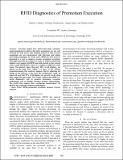RFID diagnostics of promotion execution
Author(s)
Hacker, Patrick A.; Floerkemeier, Christian; Sarma, Sanjay Emani; Schuh, Gunther
DownloadSarma_RFID diagnostics.pdf (1.228Mb)
PUBLISHER_POLICY
Publisher Policy
Article is made available in accordance with the publisher's policy and may be subject to US copyright law. Please refer to the publisher's site for terms of use.
Terms of use
Metadata
Show full item recordAbstract
Previous studies have shown that many consumer goods manufacturers believe that their promotions are not well executed in retail stores. One common concern is that in-store promotions are not synchronized with television and online advertising campaigns. In recent years, RFID has been actively promoted as a tool to improve in-store promotion execution. This paper presents the results of a study in which promotional displays were tagged with RFID tags and tracked as they moved from a retail distribution center to a number of different retail stores. The analysis shows that only 28% of all displays are placed on the shop floor within +/-3 days of the official promotion launch. Our analysis suggests that by adjusting the timing of the delivery to the store the performance could be improved such that 87% of all displays are present on the shop floor within this time frame. The results confirm that RFID is a useful diagnostics tool to measure promotion execution performance and to identify business process shortcomings. The results also suggest that a continuous measurement via RFID is not required to improve performance.
Date issued
2010-04Department
Massachusetts Institute of Technology. Auto-ID LaboratoryJournal
Proceedings of the 2010 IEEE International Conference on RFID (IEEE RFID 2010)
Publisher
Institute of Electrical and Electronics Engineers
Citation
Hacker, Patrick A., Christian Floerkemeier, Sanjay Sarma, and Gunther Schuh. RFID Diagnostics of Promotion Execution. In 2010 IEEE International Conference on RFID (IEEE RFID 2010), 134-140. Institute of Electrical and Electronics Engineers, 2010. © Copyright 2010 IEEE.
Version: Final published version
Other identifiers
INSPEC Accession Number: 11309203
ISBN
978-1-4244-5742-7